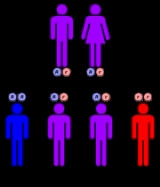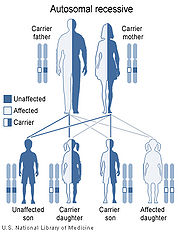
Short-chain acyl-coenzyme A dehydrogenase deficiency
Encyclopedia
Short-chain acyl-coenzyme A dehydrogenase deficiency (SCADD), also called ACADS deficiency and SCAD deficiency, is an autosomal
recessive fatty acid oxidation disorder which affects enzymes required to break down a certain group of fats called short chain fatty acid
s.
), a lack of energy (lethargy), poor feeding, and failure to gain weight and grow at the expected rate (failure to thrive). Other features of this disorder may include poor muscle tone (hypotonia
), seizures, developmental delays, and a small head size (microcephaly
). The symptoms of short-chain acyl-CoA dehydrogenase deficiency may be triggered by periods of fasting or during illnesses such as viral infections. In some cases, signs and symptoms may not appear until adulthood, when some individuals may develop muscle weakness and wasting. Other people with gene mutations that can cause this disorder may have such mild symptoms that they are never diagnosed. Many biochemical geneticists consider this to be a biochemical phenotype with a very mild clinical phenotype or no clinical phenotype.
 SCADD is caused by mutation
SCADD is caused by mutation
s in the ACADS
gene, located on chromosome
12q22-qter
. Mutations in the ACADS gene lead to inadequate levels of an enzyme called short-chain acyl-CoA dehydrogenase, which is important for the breakdown of short-chain fatty acids. Reduced levels of this enzyme prevent short-chain fatty acids from being further broken down and processed in the mitochondria (the energy-producing centers inside cells). As a result, these short-chain fatty acids are not converted into energy, which can lead to the signs and symptoms of this disorder, such as lethargy and hypoglycemia.
The disorder is inherited in an autosomal recessive manner. This means the defective gene responsible for the disorder is located on an autosome
(chromosome 12 is an autosome), and two copies of the defective gene (one inherited from each parent) are required in order to be born with the disorder. The parents of an individual with an autosomal recessive disorder both carry
one copy of the defective gene, but usually do not experience any signs or symptoms of the disorder.
Autosome
An autosome is a chromosome that is not a sex chromosome, or allosome; that is to say, there is an equal number of copies of the chromosome in males and females. For example, in humans, there are 22 pairs of autosomes. In addition to autosomes, there are sex chromosomes, to be specific: X and Y...
recessive fatty acid oxidation disorder which affects enzymes required to break down a certain group of fats called short chain fatty acid
Short chain fatty acid
Short-chain fatty acids are a sub-group of fatty acids with aliphatic tails of less than six carbons. They include:* Acetic acid* Propionic acid* Isobutyric acid * Butyric acid* Isovaleric acid...
s.
Characteristics
Some affected infants will exhibit vomiting, low blood sugar (hypoglycemiaHypoglycemia
Hypoglycemia or hypoglycæmia is the medical term for a state produced by a lower than normal level of blood glucose. The term literally means "under-sweet blood"...
), a lack of energy (lethargy), poor feeding, and failure to gain weight and grow at the expected rate (failure to thrive). Other features of this disorder may include poor muscle tone (hypotonia
Hypotonia
Hypotonia is a state of low muscle tone , often involving reduced muscle strength. Hypotonia is not a specific medical disorder, but a potential manifestation of many different diseases and disorders that affect motor nerve control by the brain or muscle strength...
), seizures, developmental delays, and a small head size (microcephaly
Microcephaly
Microcephaly is a neurodevelopmental disorder in which the circumference of the head is more than two standard deviations smaller than average for the person's age and sex. Microcephaly may be congenital or it may develop in the first few years of life...
). The symptoms of short-chain acyl-CoA dehydrogenase deficiency may be triggered by periods of fasting or during illnesses such as viral infections. In some cases, signs and symptoms may not appear until adulthood, when some individuals may develop muscle weakness and wasting. Other people with gene mutations that can cause this disorder may have such mild symptoms that they are never diagnosed. Many biochemical geneticists consider this to be a biochemical phenotype with a very mild clinical phenotype or no clinical phenotype.
Cause and Genetics

Mutation
In molecular biology and genetics, mutations are changes in a genomic sequence: the DNA sequence of a cell's genome or the DNA or RNA sequence of a virus. They can be defined as sudden and spontaneous changes in the cell. Mutations are caused by radiation, viruses, transposons and mutagenic...
s in the ACADS
ACADS
ACADS is a gene associated with short-chain acyl-coenzyme A dehydrogenase deficiency.-External links:*...
gene, located on chromosome
Chromosome
A chromosome is an organized structure of DNA and protein found in cells. It is a single piece of coiled DNA containing many genes, regulatory elements and other nucleotide sequences. Chromosomes also contain DNA-bound proteins, which serve to package the DNA and control its functions.Chromosomes...
12q22-qter
Chromosome 12 (human)
Chromosome 12 is one of the 23 pairs of chromosomes in humans. People normally have two copies of this chromosome. Chromosome 12 spans about 143 million base pairs and represents between 4 and 4.5 percent of the total DNA in cells.Identifying genes on each chromosome is an active area of genetic...
. Mutations in the ACADS gene lead to inadequate levels of an enzyme called short-chain acyl-CoA dehydrogenase, which is important for the breakdown of short-chain fatty acids. Reduced levels of this enzyme prevent short-chain fatty acids from being further broken down and processed in the mitochondria (the energy-producing centers inside cells). As a result, these short-chain fatty acids are not converted into energy, which can lead to the signs and symptoms of this disorder, such as lethargy and hypoglycemia.
The disorder is inherited in an autosomal recessive manner. This means the defective gene responsible for the disorder is located on an autosome
Autosome
An autosome is a chromosome that is not a sex chromosome, or allosome; that is to say, there is an equal number of copies of the chromosome in males and females. For example, in humans, there are 22 pairs of autosomes. In addition to autosomes, there are sex chromosomes, to be specific: X and Y...
(chromosome 12 is an autosome), and two copies of the defective gene (one inherited from each parent) are required in order to be born with the disorder. The parents of an individual with an autosomal recessive disorder both carry
Genetic carrier
A genetic carrier , is a person or other organism that has inherited a genetic trait or mutation, but who does not display that trait or show symptoms of the disease. They are, however, able to pass the gene onto their offspring, who may then express the gene...
one copy of the defective gene, but usually do not experience any signs or symptoms of the disorder.

